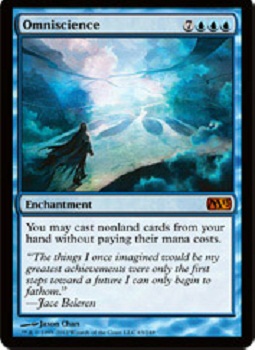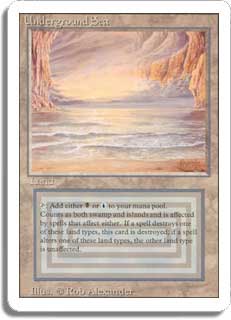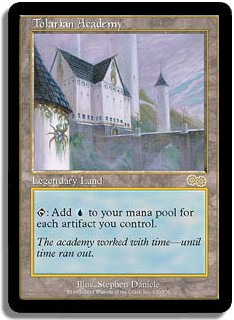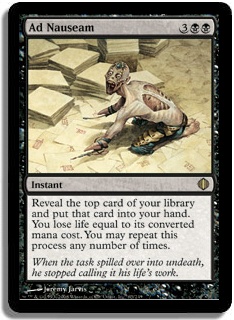Time to celebrate—we got Land Tax back! The only thing I’m wondering now is if I the DCI just coincidentally agreed or if those nice folks actually read what I had to say and agreed that it’s time for trying out some things. Either way, thanks for letting all those Deck Parfait fans out there enjoy themselves again.
To be totally honest, I’m very happy to have that particular old friend back, even though I doubt it will revolutionize anything in the current format. Curves are too low (making Tax hard to trigger) and the payoff isn’t that big, given that you can do similar shenanigans with Squadron Hawks without investing all that deck space into actually making Land Tax work. Still, the card has a lot of raw power when it’s working and I’m sure some sweet things can be done with it; I just haven’t figured them out yet. I’ll let you know in a future article if I have any sweet lists to share.
Fear not, though; I still have something sweet for you. Look what I brought to class today:

So I can just cast everything? That does seem kinda good…
Wizards is clearly ready to keep pushing the envelope with permanents that will often win the game as soon as they hit the table and this latest offender is about to appear in M13, just in time to not be legal for GP Atlanta but ready to shake up GP Ghent.
While this particular whammy should probably be called “Omnipotence” instead of Omniscience (much more appropriate for something that allows you to do whatever; Omniscience makes me think of playing with my library face up and playing spells from it…), one can’t deny the card’s power. I mean, it’s essentially the whole High Tide mana engine rolled into one nice compact piece of cardboard.* Being able to cast every single spell you have access to does sound pretty broken if not for that ten-mana price tag.
I wonder if someone could come up with a clever way to get around that devastating issue by using some innovative deckbuilding and searching for that hidden gem somewhere in the Legacy card pool everyone has overlooked that will make him omniscient and allow him to reap the rewards of his innovation… Oh, wait. Scratch that. Let’s just Show and Tell it; that works just fine for everything else already, after all. As a bonus, it even has perfect flavor—in Show and Tell exercises at the Tolarian Academy, you learn how to make infinite mana? You don’t say.
Time To Show
Here’s what I’ve come up with:
Creatures (4)
Lands (19)
Spells (37)

Yes, this list is somewhat different from other so-called Show and Tell decks. There isn’t something sweet like Sneak Attack to work as a backup plan in case you don’t find Show and Tell, and you also can’t plan on hard casting Omniscience the same way you would Hive Mind or Dream Halls. Instead, you’re all in on the Show and Tell plan. So if you have to go all in on a single plan, why would you play this over something proven like Sneak and Show or even Hive Mind / Dream Halls?
Time To Tell
Starting with current darling Sneak and Show, you have two advantages. First, a backup plan if creature-based wins are out of the question (think Humility or even just Karakas making things complicated). Second, you will often be able to just win the game the turn Show and Tell resolves instead of having to wait for another untap.
Now, these two points are something both Dream Halls and Hive Mind can match if they hit their enchantments, but even then this deck still has two significant advantages. For one, you get to run Griselbrand as your backup plan instead of Emrakul or Progenitus, which is a pretty big step in the right direction. The big, bad Demon father of doom is just a much better Show and Tell “target” than Emrakul, the Aeons Torn because he often effectively wins as soon as he hits the table (instead of needing another turn). Even if he gets removed through seven to fourteen new cards, those cards should allow you to set up the Omniscience win for next turn. I don’t think I need to explain why Progenitus is a terrible fatty to Show into play.
The other point where fatty choice matters is if you draw into either under Omniscience, both GriselB and Emrakul should win the game at that point; though an argument could be made for Emrakul in case your opponent has a Karakas (remember, you do get the Time Walk).
The biggest advantage you get over those decks, though, is in deck space efficiency. You don’t waste slots on crappy cards like Conflux, Beacon of Immortality, or Pact of the Titan. Instead, you get to run as many cantrips as High Tide or U/B ANT, meaning you’ll end up significantly more consistent than traditional Show and Tell decks while having a kill that can also get you going: Burning Wish.Â
Wish really is the perfect card for this deck. It can Tutor for Show and Tell, but once you have Omniscience in play, it also instantly wins the game. How? Well, use it to get a Petals of Insight and play that a hundred times (always choosing to move the cards to the bottom, obviously). Once you have sufficient storm, keep casting it until you hit another Burning Wish, get Grapeshot, and dome them.
If your head judge is ok with it, you should even be able to set up whatever combination of cards you want to draw with your Petals of Insight as long as your library-size can’t be divided by three (you can put the cards on the bottom of your library in any order).** Why would you want to do that? Maybe you need countermagic to play through a Stifle or maybe your opponent also has a Leyline of Sanctity in play, meaning you also need an answer.
Other than just instant winning with Burning Wish, Omniscience also allows you to drop a Griselbrand into play—which, with unlimited spellcasting ability, should spell GG—and to chain cantrips like mad (to find a Griselbrand or Burning Wish).
Other than that, we have mana and ways to protect your Show and Tells. I straight up stole the mana base from Sneak and Show, switching an Ancient Tomb for another City of Traitors because the damage mattered surprisingly often and losing the land usually didn’t given careful play.
As for the protection package, I cut one of the Misdirections only because you actually need some kind of business in hand to make Omniscience into a game win, which doesn’t harmonize well with too many pitch-counters depleting your hand.
Looking at the sideboard, we see eight real cards and seven Wish targets. Of the latter, Petals and Grapeshot form our much-needed win condition, Show and Tell takes care of the other end of business, Overmaster is a sweet way to bleed countermagic, and Eye of Nowhere takes care of random enchantments and artifacts that keep you from winning. Pyroclasm and Virtue’s Ruin finally allow you to get rid of Maverick’s hate bears, with Pyroclasm being the faster solution and Ruin the more reliable one.
And yes, the singleton Underground Sea to enable Ruin has definitely been worth it so far (even given the fact that a lot of Virtue’s Ruins have been cast under Omniscience). The mini removal package is so good, in fact, that it sometimes allows you to play the match similar to a control deck, where you let them line up their offense and defense just to get swept on turn 4. This is a very powerful option if you brick on cantrips, too.
As for the regular cards, I’m not sure if the Leylines are correct as you can’t cantrip into them, but I want four pieces of graveyard hate in those slots. Dredge and Reanimator are among the few decks that are faster than you are and that means they should be addressed.
Red Elemental Blast and Flusterstorm allow us to further upgrade the MD counter package after boarding against control and have utility against different non-counter problems (Meddling Mage or discard, respectively). The Echoing Truths finally serve as classic outs against different forms of permanent based hate.
School’s Out
Now, I’ve only played a few dozen games with this list so there is some tuning left to do. Given the strength of the original skeleton and the increased card quality compared to Hive Mind and Dream Halls, though, I think Omniscience Show and Tell is Sneak and Show’s closest contender for title of best Show and Tell deck—and the Omniscience build should be ahead in consistency and resilience to hate. That’s the theory at least. Time to figure out if I’m correct.
And there you have it: the likely next step of Show and Tell evolution. If you enjoy dropping big things into play, casting spells for free, and drawing cards in quantities of seven, this deck should be right up your alley. There is a ton of raw power, and even with all the cantrips the deck isn’t particularly hard to play. All you need to do is find two pieces, after all.
That’s it for today. Let me know in the comments if there are any sweet tricks the deck could use that I’ve overlooked or if there’s anything else you’d like me to elaborate on. Until next time: be a know-it-all!
*Let me take a moment to comment on what seems to be R&D’s current design philosophy: make things really big and really splashy, leading to things like Titans on turn 6 and Emrakul-esque threats at on 8+.
I think this approach to card creation is being taken too far lately. Maybe I’m too much of a Johnny or Spike instead of a Timmy, but cards like Emrakul, the Aeons Torn, Griselbrand, and Omniscience feel like terrible designs. Sure, they’re crazy, they’re splashy, and they are extremely exciting when you crack them in a booster pack. They’re also terrible for creative deckbuilding and gameplay.Â
Instead of allowing players to figure out weird card interactions to create engines that allow decks to do sick things like producing tons of mana to fuel draw spells which find more engine pieces, leading to more mana, and so on and so forth, we now simply get permanents that do something so powerful that getting them down is 80%+ good game straightaway.
I mean, how much creativity really goes into abusing something like Omniscience? As soon as it hits the board, mana doesn’t matter anymore so designing a deck for it is easy. Find a way to get it into play, have a ton of card draw and some way to win in your deck, there you go. For other things, you at least have some hoops to jump through (get spells, get a working mana engine, find room for disruption, etc.). With permanents like these it’s totally obvious you won’t cast them, so all you need to find is a way to cheat them into play, and they’ll do the rest. Makes deckbuilding much less interesting than something like Mind’s Desire, Tolarian Academy, or even Ad Nauseam.
In the same vein, playing a deck like High Tide well is an art. You need to constantly balance your ability to generate mana with your ability to access cards and to continue going off. With Omniscience, every decision is straightforward. You check if you have access to something that cheats it into play, and once you get it down you simply play every spell you draw until you either win or your card drawing happens to crap out on you. How is that even fun?
In short, these dumb, brute force permanents Wizards has been printing ever since Rise of the Eldrazi show a design direction I personally find discouraging. Instead of promoting creativity and outside the box thinking, they come as complete win the game kits as long as you can figure out how to get them into play—an exercise that becomes quite bland once you’ve done it a few times. It isn’t only the really big things; even the Titans are nothing but another manifestation of the same development, albeit lower on the curve and therefore slightly less overwhelming. The effect on games and deckbuilding is quite similar, though.
Haymakers may be exciting, but that’s true for a limited time only. If most games start playing out as one overpowered threat just trumping another overpowered threat, the more common and, frankly, boring that type of gameplay becomes. Can we please get back the sweet back and forth of answers and threats we had before design became focused on making Titans instead of Vindicates and Pernicious Deeds? Magic is so much more interesting if the interaction between one’s own cards makes things powerful instead of every single card basically being able to win the game on its own.
**Given the fate of the Four Horsemen deck, I’m unsure if casting Petals hundreds of times to keep rearranging your library is considered slow play or not. Given how the rules are worded, it might be dependent on how good you are at math. There clearly is a finite number of iterations needed to bring your library into exactly the order you want it in, though personally I wouldn’t be able to tell how many exactly from any given library state—especially given you only get to look at it in three card chunks. If someone would like to enlighten me as to how this would work out if a judge is called, I’d appreciate it.Â









